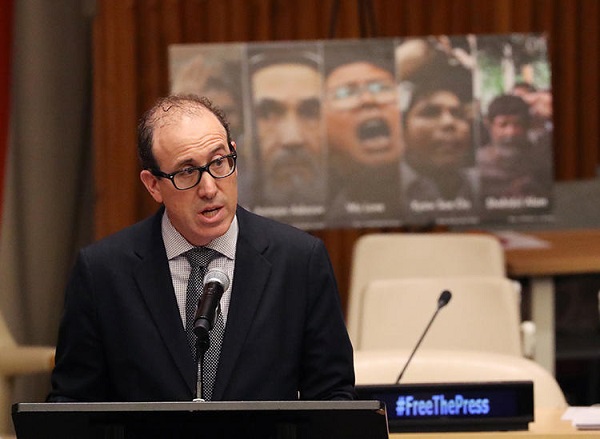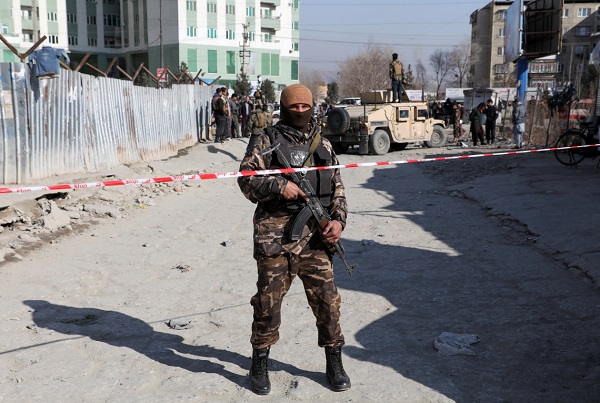Joel Simon speaks “On the Media”

In a segment for WNYC’s “On the Media” on July 23, CPJ’s executive director, Joel Simon, spoke to Brooke Gladstone about how this is the deadliest and most dangerous time to be a journalist that he’s ever seen. “There’s a complete transformation of the information environment,” Simon said. “It’s the end of the information monopoly that journalists once held.”
Still, Simon added, he does not feel pessimistic about the future. “I feel like we’re living through a terrible and prolonged crisis,” he said. “But I also believe at the root is a very essential human need, which is to be informed and have the information we need to make sense of our lives. Those impulses will somehow and someway overcome all the obstacles, the violence, the repression, the challenges to the industry. I do believe that’s the future.”
To hear Simon’s interview, click here.
CPJ calls on U.S. to support Afghans who helped journalists

As the security situation in Afghanistan deteriorates, and the Taliban continues to gain power, Afghan journalists working for U.S. media organizations are facing imminent threat. With their lives in jeopardy, many may be forced to leave the country.
Working with a coalition of U.S. news and press freedom groups, CPJ is supporting Afghan journalists at risk and helping to evacuate the most vulnerable. Together, we are also calling on the U.S. government to provide humanitarian assistance and emergency visas to Afghans who have worked with U.S. media outlets as journalists, interpreters, and support staff.
We issued a letter to President Joseph Biden and Secretary of State Antony Blinken, and sent another to Congressional leadership, including U.S. Senate Majority Leader Chuck Schumer, Senate Minority Leader Mitch McConnell, House Speaker Nancy Pelosi, and House Minority Leader Kevin McCarthy. Both letters emphasized how, without the help of the U.S. government, some of the Afghans would “face grievous harm and death for having done nothing more than lent their labor and skills to making certain the world knew what was going on in their country” while U.S. troops were there for 20 years.
At least five journalists were killed in Afghanistan last year, CPJ research found. Most recently, in July, Reuters photojournalist Danish Siddiqui was killed while covering a clash between security forces and Taliban fighters.
Journalists identified as possible targets of Pegasus spyware

At least 180 journalists have been identified as possible targets of Pegasus, a spyware created for mobile devices that transforms a cellphone into a surveillance station. The spyware gives the attacker the ability to monitor, record, and collect existing and future data, including information from messaging apps and real-time location.
By implanting Pegasus on cellphones, governments can have unfettered access to all communications on the phone, thus endangering the security of a journalist and the journalist’s sources.
In July, CPJ spoke to an Azerbaijani journalist who was shocked to learn that she had the spyware on her phone. “I was always aware that the [Azerbaijani] security service listens to our phone calls,” Sevinj Vagifgizi said, “but I never imagined that they could access anything through the internet and can record voices and take videos, and listen to and read everything I write or say.”
Vagifgizi added that she was now concerned about her sources, who didn’t want the authorities to know that they were in touch. “I was also concerned about my colleagues,” she added, “who didn’t want the authorities to know about them because if the authorities find out who they are, it may cause problems for them.”
The Israeli company NSO Group, which produces the Pegasus spyware, has repeatedly told CPJ that it licenses the spyware to fight crime and terrorism, and has dismissed the most recent reports as false. However, researchers have documented the spyware being used to surveil journalists around the world.
In an interview with CPJ’s executive director, Joel Simon, in July, WhatsApp Head Will Cathcart called the issue of spyware—especially unaccountable spyware—a huge problem. “The new reporting shows the much, much larger scale of the problem,” Cathcart said. “This should be a wake-up call for security on the internet.”
CPJ continues to combat the threat of spyware to journalists and press freedom, recently reiterating our call for companies and governments to stem the abuse of this powerful technology. In March, we issued a policy brief that calls on governments to bar the use of spyware on journalists, and launched a campaign highlighting the threats that spyware poses to press freedom. Our Emergencies team has published digital safety advice for journalists on keeping their information safe and has issued specific guidance on Pegasus for journalists in eight languages, including Russian and Turkish.
Must-reads
The Hong Kong Journalists Association is reporting that authorities are using the national security law to silence the media. “With the political ‘red line’ almost everywhere, pressure on free thinking is mounting,” the group’s chairman says.
Following the killing of renowned crime reporter Peter de Vries in the Netherlands, CPJ’s Jan-Albert Hootsen interviews three journalists about the impact of the attack on de Vries and the response. Hootsen is CPJ’s Mexico representative, but happened to be home in Holland when the murder occurred.
CPJ signed on to a joint statement calling on Kyrgyz authorities to conduct an independent investigation into the death of Azimjon Askarov, journalist and winner of CPJ’s 2012 International Press Freedom Award. Askarov, who was serving a life term in prison, died in custody in July 2020.
CPJ in the news
“‘America turned its back on Afghanistan’: Stranded Afghan journalist sees US betrayal,” Mother Jones
“Jury finds Capital Gazette gunman responsible and rejects his mental illness plea,” NPR
“Famous Dutch crime journalist Peter R. de Vries dies in hospital after being shot in the street,” CNN
“The ugly roots of the violent global crackdown on journalists,” The Washington Post
“Burundi’s lifting of media ban met with cautious optimism,” VOA
“When it comes to whistleblowers like Julian Assange, Biden’s actions look a lot like Trump’s,” San Francisco Chronicle